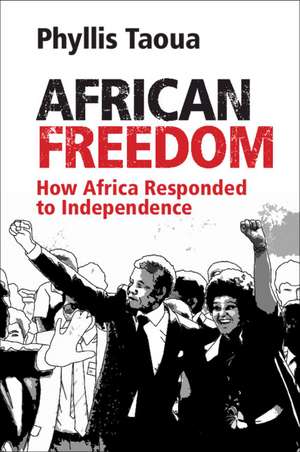African Freedom: How Africa Responded to Independence
Autor Phyllis Taouaen Limba Engleză Paperback – 25 iul 2018
| Toate formatele și edițiile | Preț | Express |
|---|---|---|
| Paperback (1) | 229.83 lei 3-5 săpt. | |
| Cambridge University Press – 25 iul 2018 | 229.83 lei 3-5 săpt. | |
| Hardback (1) | 682.44 lei 6-8 săpt. | |
| Cambridge University Press – 25 iul 2018 | 682.44 lei 6-8 săpt. |
Preț: 229.83 lei
Nou
Puncte Express: 345
Preț estimativ în valută:
43.98€ • 45.66$ • 36.67£
43.98€ • 45.66$ • 36.67£
Carte disponibilă
Livrare economică 01-15 martie
Preluare comenzi: 021 569.72.76
Specificații
ISBN-13: 9781108446167
ISBN-10: 1108446167
Pagini: 330
Ilustrații: 9 b/w illus.
Dimensiuni: 151 x 228 x 16 mm
Greutate: 0.54 kg
Editura: Cambridge University Press
Colecția Cambridge University Press
Locul publicării:Cambridge, United Kingdom
ISBN-10: 1108446167
Pagini: 330
Ilustrații: 9 b/w illus.
Dimensiuni: 151 x 228 x 16 mm
Greutate: 0.54 kg
Editura: Cambridge University Press
Colecția Cambridge University Press
Locul publicării:Cambridge, United Kingdom
Cuprins
Introduction. The meaning of freedom in Africa; 1. The self: unfettering identity after independence; 2. Gender: women's engagement with freedom; 3. The nation: from liberation to meaningful freedom; 4. Global Africa: pillaging with less impunity in the era of neoliberal capital; 5. The spiritual realm: Okonkwo's unraveling and other responses; Conclusion.
Recenzii
'African Freedom: How Africa Responded to Independence is a refreshingly ambitious work of synthesis that revisits many canonical works of postcolonial African fiction and cinema to reframe them as creative explorations of the idea of freedom. It places these works in dialogue with the key political figures of anticolonial struggle and national liberation and argues that the creative voices on freedom both critique the limitations of the new political dispensation after independence and keep alive an aspirational yearning for 'meaningful' freedom that is more than just an ideal.' Eleni Coundouriotis, University of Connecticut
'This is highly accomplished. A very expansive and stimulating exploration of an enduring theme. A true labor of love.' Tejumola Olaniyan, University of Wisconsin, Madison
'… this is a fine work; it provides a comprehensive perceptive and engaging intervention into the multifaceted concept and realities of freedom that continue to materially affect Africa. We are forced to challenge our own understanding of freedom and, through pan-African cultural case studies, rethink how we perceive the continent.' Matt Graham, Times Higher Education
'Describing the liberation of Africa as an 'incomplete process', Taoua looks at how freedom is conceived of by contemporary Africans. She identifies what she sees as three key types of freedom and discusses their importance for nations, global capital, gender identity and more.' Jessica Watson, Survival
'… a powerful and important book that opens up new perspectives on the history of the struggle for freedom in Africa, and it deserves a wide readership.' Emma Hunter, H-Diplo
'This is highly accomplished. A very expansive and stimulating exploration of an enduring theme. A true labor of love.' Tejumola Olaniyan, University of Wisconsin, Madison
'… this is a fine work; it provides a comprehensive perceptive and engaging intervention into the multifaceted concept and realities of freedom that continue to materially affect Africa. We are forced to challenge our own understanding of freedom and, through pan-African cultural case studies, rethink how we perceive the continent.' Matt Graham, Times Higher Education
'Describing the liberation of Africa as an 'incomplete process', Taoua looks at how freedom is conceived of by contemporary Africans. She identifies what she sees as three key types of freedom and discusses their importance for nations, global capital, gender identity and more.' Jessica Watson, Survival
'… a powerful and important book that opens up new perspectives on the history of the struggle for freedom in Africa, and it deserves a wide readership.' Emma Hunter, H-Diplo
Notă biografică
Descriere
A comprehensive synthesis of the ideal of freedom in African culture from a pan-African perspective after independence.
